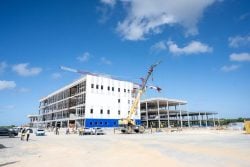While many governments in the world are plotting exit strategies from the crisis measures adopted over the last year, the center-leftist Lula is seizing the opportunity to push for a stronger state role in the economy.
The increased intervention has raised concerns about public finances and is generating uncertainty for investors as the remainder of Lula’s term through December 2010 could be less predictable than his previous seven years in office.
Last month, the Lula administration taxed foreign capital inflows to help stabilize the local currency, floated a proposal for a state company to expand broadband coverage in competition with the private sector, and threatened to charge a levy on iron ore exports to pressure mining giant Vale into building steel mills in Brazil.
Lula is pushing a bill in Congress that would increase government control over the oil sector, capitalize state energy company Petrobras and grant it a minimum stake in any joint venture in newly discovered oil fields.
He has also shored up state development bank BNDES with 100 billion reais ($56.6 billion) from the national Treasury and instructed other government banks to compete more aggressively with their private counterparts for market leadership.
“These signs are not good. I am very worried and so is everybody in industry,” said Pedro Passos, president of IEDI, an industry-funded economic think tank in Sao Paulo.
“When the government starts talking about powerful state companies and grand development schemes, we are very cautious because it has failed before,” he added.
Nobody expects Lula, a former labor union leader who has governed mostly as a centrist, to abandon the pillars of Brazil’s economic stability or embrace more radical left-wing economic policies like those adopted in other South American countries, including Venezuela, Ecuador and Bolivia.
“The government definitely has become more affirmative but it’s a cautious, calculated type of intervention,” said Jose Luciano Dias, a political consultant in Brasilia.
SQUEEZED BUDGET
But a slew of tax breaks for key industries, massive loans to state enterprises and increased spending to finance a burgeoning state apparatus have compounded the impact of falling tax revenues.
The primary budget surplus, a measure of the government’s ability to service its debt, had one of its worst showings ever in September, slumping to 1.7 percent of gross domestic product for the year from 5.1 percent in the same period in 2008.
Brazil navigated the global financial crisis better than most by aggressively cutting interest rates, slashing bank reserve requirements to free up money for lending, giving tax breaks to the automobile and home appliance industries, and strong-arming state banks into increasing lending.
Its success gave it an even stronger voice in forums like the Group of 20 developed and emerging economies, and Lula has appeared to grow bolder.
“Suddenly they realized our economy was much more solid than theirs,” Lula told business leaders last month, in reference to major industrialized nations. “This crisis is allowing the state to become a (real) state again.”
When Lula took office in 2003, he quickly abandoned the fiery anti-capitalistic rhetoric of his past and instead largely followed the centrist path of his predecessor, Fernando Henrique Cardoso, while spending more on anti-poverty programs. Lula’s pro-market policies won him praise on Wall Street but also earned him some enemies on the left who felt betrayed.
Some analysts say Lula, who cannot run for a third consecutive term, is now preaching big government again to help get his chosen successor, chief of staff Dilma Rousseff, elected in next year’s presidential vote.
“Maybe it’s electoral posturing, along the lines of ‘You either adhere to the idea of a big state or you’re not a patriot’,” Arminio Fraga, chairman of Brazil’s BM&FBovespa financial exchange and former central bank president under Cardoso, told the Valor Economico newspaper last week.
Lula, who won re-election in 2006 in part by criticizing privatization under his predecessor, wants to contrast economic success and government intervention in his term with stagnation and “laissez faire” policies previously, analysts said.
The economy has grown at an annual average of 4.1 percent under Lula, compared with an average of 2.3 percent in the previous eight years under the more conservative Cardoso.
Still, all the talk of more government intervention, higher budget deficits and bigger state companies may prove unsettling for investors. Lula’s respected central bank chief, Henrique Meirelles, may also step down early next year to make a jump into politics, a development that could add to the jitters.
“Even if it’s more campaign rhetoric than reality, such noise heightens uncertainty,” said Bolivar Lamounier, a political scientist based in Sao Paulo. ($1=1.768 reais)




